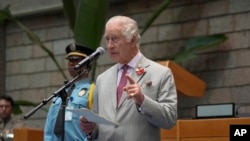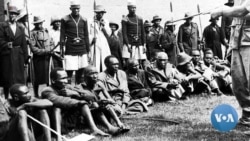Britain’s King Charles said Tuesday there is “no excuse” for the “abhorrent and unjustifiable acts of violence” committed against Kenyans during the East African nation’s struggle for independence from British colonial rule.
The monarch made the acknowledgement during a state banquet in Nairobi at the start of a four-day state visit by Charles and Queen Camilla. The visit comes ahead of celebrations marking the 60th anniversary of Kenya’s independence on December 12.
More than 10,000 Kenyans were killed and others rounded up, detained and tortured during the brutal suppression of the Mau Mau uprising at the hands of British authorities between 1952 and 1960.
Charles told the attendees the “wrongdoings of the past are a cause of the greatest sorrow and the deepest regret.” He said that by addressing the past with “honesty and openness,” the two nations could “continue to build an ever closer bond in the years ahead.”
But the king did not offer a full-fledged apology for the atrocities as many Kenyan activists are demanding.
Kenyan President William Ruto, who hosted the banquet, said the response to African independence movements was “monstrous in its cruelty.” Ruto acknowledged that while Britain has made efforts to “atone for the death, injury and suffering” inflicted on Kenyans, “much remains to be done in order to achieve full reparations.”
Britain agreed to a $24 million settlement in 2013 for more than 5,000 Kenyans who suffered abuse during the revolt.
Charles’s visit to Kenya is his first to a member country of the 56-nation Commonwealth, comprised mostly of former British colonies, since his succession to the throne after the death of his mother, Queen Elizabeth, last year. Her historic 70-year reign began in 1952 when her father, King George VI, died while then-Princess Elizabeth was visiting Kenya with her husband, the late Prince Philip.
Some information for this report came from The Associated Press, Reuters and Agence France-Presse.







